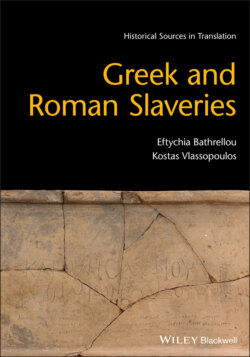Читать книгу Greek and Roman Slaveries - Eftychia Bathrellou - Страница 12
PROPERTY AND DOMINATION: “CHATTEL SLAVES” AND OTHERS 1.1 Aristotle, Politics, 1253b23–1254a17:11 Greek Philosophical Treatise (Fourth Century BCE)
ОглавлениеLiterature: Garnsey 1996: 107–27; Millett 2007; Vlassopoulos 2011a.
Because property is part of the household, so the art of acquiring property is part of household management – for both living and living well are impossible without the necessaries. Now, as a specific art would have to have its own proper tools, if its work is to be accomplished, so is the case with the person practicing household management. Tools can be inanimate or animate. For example, for the helmsman, the helm is an inanimate tool, while the look-out man an animate one (for when an art is concerned, an assistant is a kind of tool). Accordingly, a possession is a tool for maintaining life; property is a multitude of tools; a slave is a kind of animate possession; and every assistant is like a tool before tools. For if every tool could accomplish its own task when ordered or by sensing in advance what it should do […], then master-builders would not need assistants, nor would masters need slaves.
“Possessions” are spoken of in the same way as “parts.” A part is not merely a part of another entity but also is wholly of that other entity. The same is true of a possession. This is why a master is just the master of his slave, not “his slave’s” without qualification, but a slave is not merely the slave of his master but also wholly his. It is clear from these considerations then what the nature and the essential quality of a slave are. For anyone who, while being human, is by nature not of himself but of another, is by nature a slave; now, a human being is of another when, while being human, he happens to be a possession.
Property, tool, nature: how does Aristotle use these concepts to characterize slavery?
What does he mean when he claims that the master is just the master of the slave, but the slave belongs to the master completely?
Under what conditions does Aristotle think that slavery would be superfluous?
